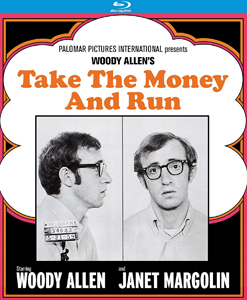“Take the Money and Run” (1969) is Woody Allen’s first traditional film as a director, since 1966’s “What’s Up, Tiger Lily?” was a “Mystery Science Theater”-style riff track where he didn’t shoot new material. While “Money” is on the drab and grey side like most of his 1960s-70s work, Allen shows he’s a natural at comedic timing.
Not-so-smooth criminal
And the style isn’t wrong for a story that would be bleak if it wasn’t so funny. It follows Virgil (Allen), a lifelong petty thief who graduates to bank robbery. It’s fun to go back and watch “Money” after viewing the later classics, because Allen originates a lot of the gags here, co-writing with Mickey Rose. (They’d later re-team for “Bananas.”)
Allen would later use the documentary style on the more inventive “Zelig.” But it’s plenty funny here to hear narrator Jackson Beck say ridiculous things in his stentorian tones.

“Take the Money and Run” (1969)
Director: Woody Allen
Writers: Woody Allen, Mickey Rose
Stars: Woody Allen, Janet Margolin, Marcel Hillaire
Allen for some reason finds loudly shuffling feet funny. He’d re-use the joke with the faux-robot in “Sleeper.” Here, a linked-together chain gang shuffles room to room in a house after escaping their work duty, trying to hide their situation from the elderly resident.
And Allen’s linkage of love with nausea is on display when Virgil meets cute with Louise (Janet Margolin) in a park. Virgil aims to steal her purse, but before long he gets that sick feeling in his stomach that tells him he’s in love.
“After fifteen minutes I wanted to marry her, and after half an hour I completely gave up the idea of stealing her purse,” Virgil says in one of “Money’s” many great scene-clinchers.
Some great gags
The film’s overall laugh ratio is high as Allen puts absurdities atop familiar set-ups. For example, his group aims to rob a bank … but another group shows up at the same time. Allen is so good at coming up with these “What ifs.” In real life, there has probably never been a simultaneous bank robbery, but what if it did happen? It would probably be funny, at least in a dark way.
But it’s the goofiest things that have me laughing the loudest. To prepare for a prison break, Virgil is tasked with stealing T-shirts from the laundry room. He does so by wearing all of them. Cut to Virgil in the cafeteria line with a smug expression, oblivious to how bulky he looks.
Money is always tight for Virgil, and “Money” is always light for viewers. The stakes are serious in the abstract – Virgil is eventually sentenced to 800 years in prison (although he thinks he can cut that in half with good behavior) – but they don’t play as serious.

How can we do anything other than laugh when Virgil’s ashamed parents are interviewed, and both don big-nose-and-mustache disguises?
Some proto-Zucker Brothers gags can be found, too. When Louise visits Virgil in prison, at another visiting station the inmate and visitor converse via ventriloquist dummies.
Off and running
“Money” is very much of a piece with “Bananas” and “Sleeper,” but I think it’s funnier than those later films. Like “Love and Death,” this one limps in the final act. Although there’s a general progression to Virgil’s criminal career, “Money” is essentially a series of gags.
The last set-up is the grimmest, as he’s on a chain gang with a warden straight out of “Cool Hand Luke.” Unless you love that foot-shuffling gag as much as Allen does, the laugh success rate falls.
But overall, “Take the Money and Run” is a breezy 90-minute showcase of a naturally funny writer successfully taking to the director job. His first masterpiece at the clapboard (“Annie Hall”) is eight years away, but he’s off and running.

